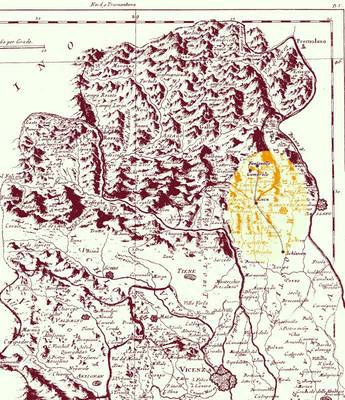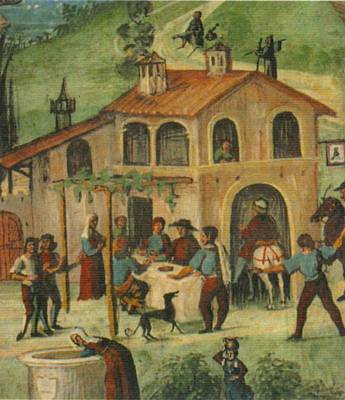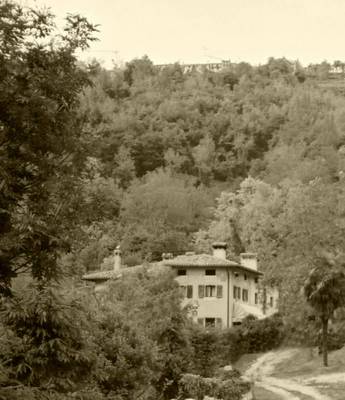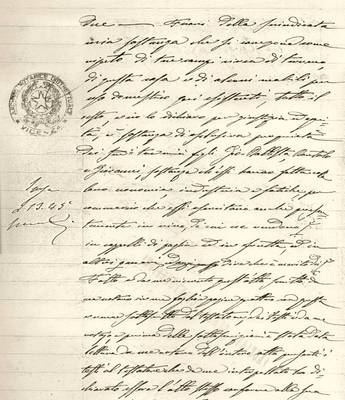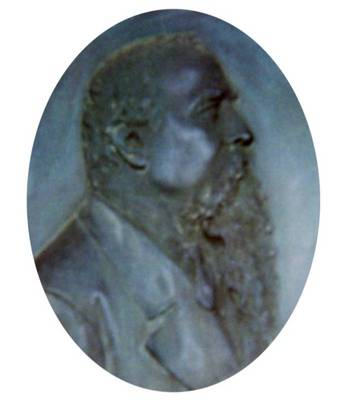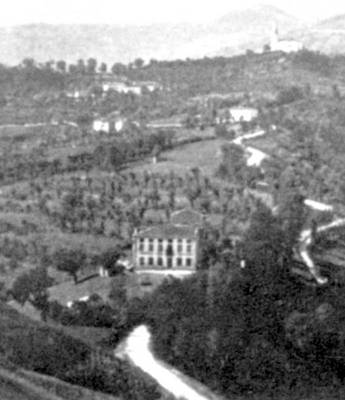History of a Veneto family
In 1818, at the time of the marriage of GioBatta and Giovanna Baron, the Poli family moved to the bride’s home situated in Via Costadema in San Luca, precisely on the territorial borders of Molvena in a position overlooking the confluence of the four streams forming the Valderio torrent.
Left a widower after fourteen years of marriage, GioBatta stayed for a long time with the family of his son Giovanni (1822-1892) in this little corner of paradise,
<< 500 years, 4 moves
The map shows the four moves made by the Poli family in a period of 500 years: Gomarolo, Fontanelle, San Luca, Schiavon. “The Vicenza district divided into its vicariates and podesterates” by G. Zuliani, Venice 1783. (Bertoliana Library, Vicenza.
passing the way for an imminent and radical change in his family.
Giovanni, not yet 23 years old, married Angela Lunardon, who lived in the same parish of Molvena. The couple had nine children, three of whom died at a very young age and one who died in his teens.
<< Tavern and horse change
GioBatta, Bortolo and Giovanni Poli opened a tavern with horse change in the mid 19th century. “Scena di osteria” (Tavern scene) engraved by G. Volpato (1740-1803). Beside, detail of a painting of a post-house by Pinturicchio (1454-1513). Spello, Church of S. Maria Maggiore.
Helped by his old father GioBatta, Giovanni worked the few fields he owned and minded the house, put in his name many years before his mother died.
<< The house in S. Luca
The house of Giovanna Baron (1795-1832) where GioBatta Poli (1792-1870) “hung up the hat” in 1818. It was situated in Via Costadema, San Luca. In the same house his grandsons GioBatta, Bortolo and Giovanni began the new activity as merchants of wine, fruits, straw hats and “other products” with adjoining tavern and horse change for those heading towards the Tableland, making it become an all-important reference point for the inhabitants of Molvena and San Luca. The Poli family lived in the house in Via Costadema from 1818 to 1885, before GioBatta and his wife Maria Moresco moved to Schiavon.
Among his merits is certainly that of having prepared the way for the economic success of his three sons, towards whom, in the following passage from his will, dated 1st April 1889, he expresses warm feelings and the pride of a father full of hope for the future of his family.
[…] Apart from my aforesaid possessions which include approximately three fields of land, this house and some furniture for domestic use existing here, all the rest,
<< The wishes of Giovanni Poli
A passage from the will of Giovanni Poli (1822-1892), dated 1st April 1889. (Notarial Archives of Vicenza, Notaio Lodovico Bernardi, vol. 913, atto 3052)
which I declare for justice and fairness, is the exclusive property of my aforesaid three sons Giovanni Battista, Bortolo and Giovanni, the property that they made with their saving, diligence and hard work, for the commerce they carry on also presently in wine, which they sell here and elsewhere both retail and wholesale, in straw hats and fruit, and other products, and I can say that it is the merit of my three sons if I have managed to keep my aforesaid possessions which were formerly in jeopardy.[…]
<< The Vicenza poet and patriot Jacopo Cabianca
Jacopo Cabianca (1809-1878) was one of the main protagonist in Veneto in the 19th century. He often retired to his villa in Longa di Schiavon, where he died at the age of seventy.
And it was the sons mentioned in the passage from the will, GioBatta, Bortolo and Giovanni, who began the new activity as merchants of wine, fruit, straw hats and “other products”, using for their work a part of the house in Via Costadema and ensuring that that area not only became an all-important reference point for the inhabitants of Molvena and San Luca, but also supplied a refreshment service and change of horses for those heading towards the Tableland.
<< San Luca in the early 20th century
In the foreground the old “Il Palazzotto” tavern, in the background the church with bell tower (San Luca Parish archives)

